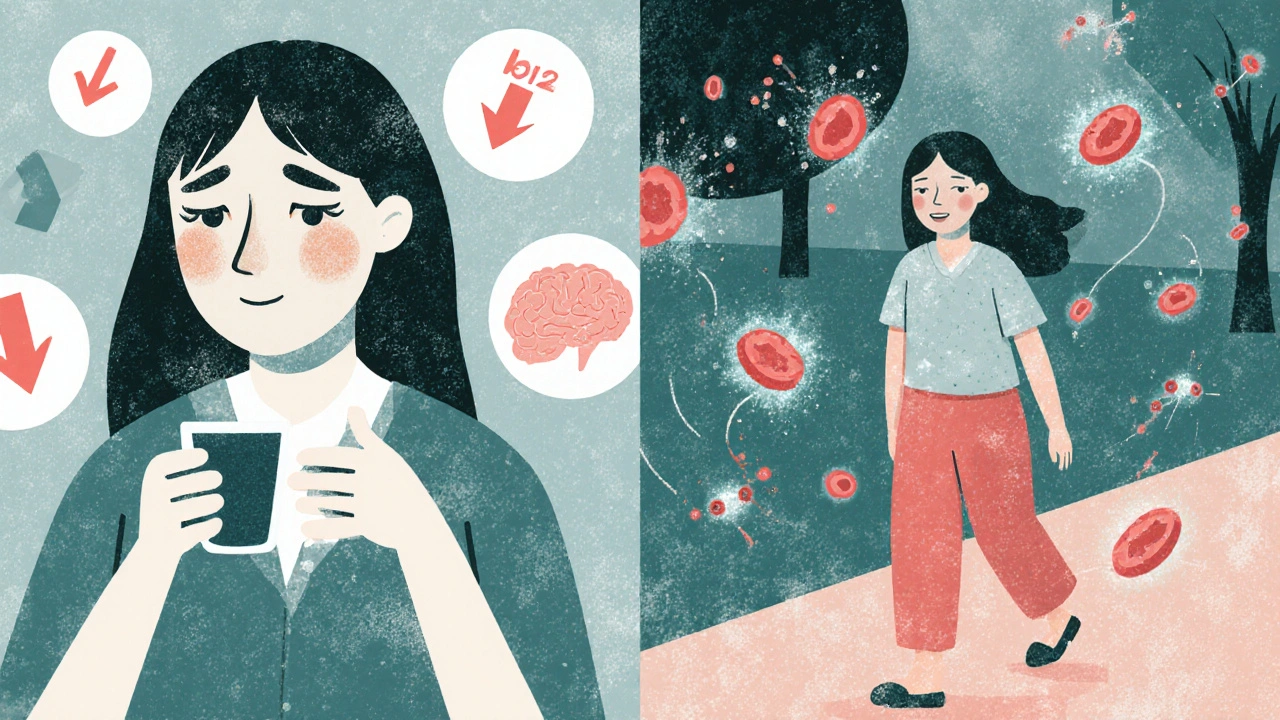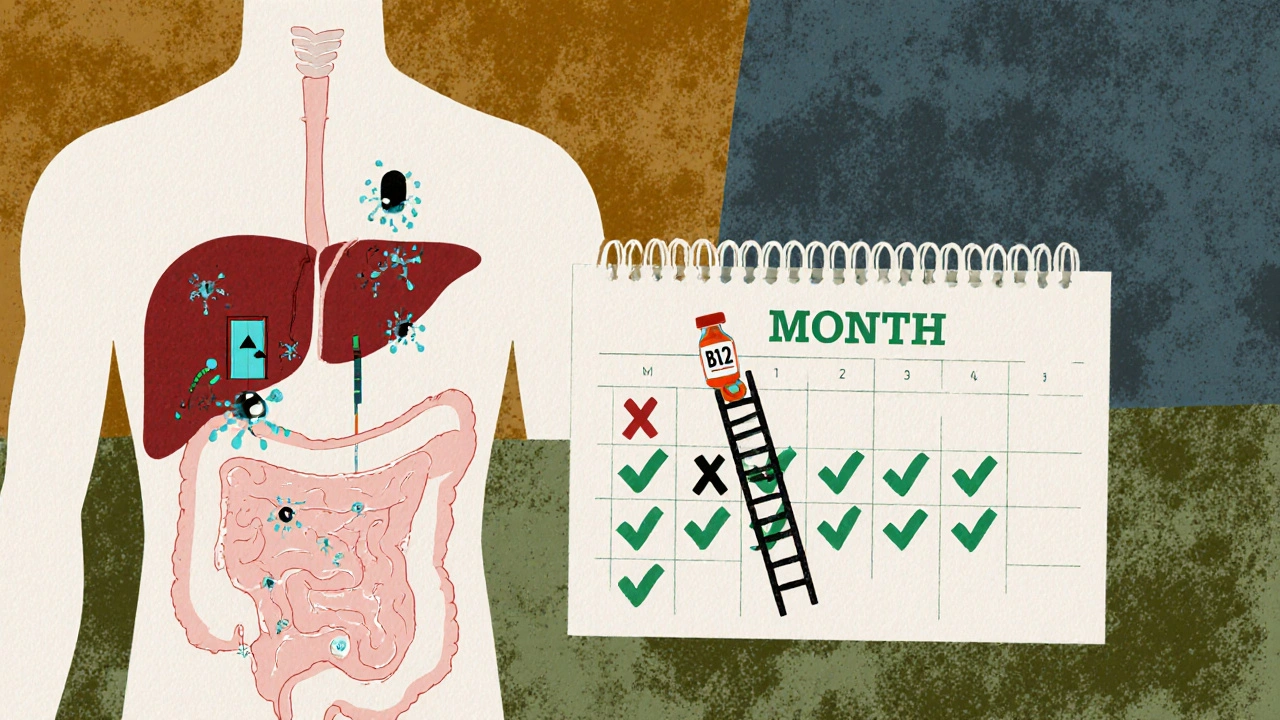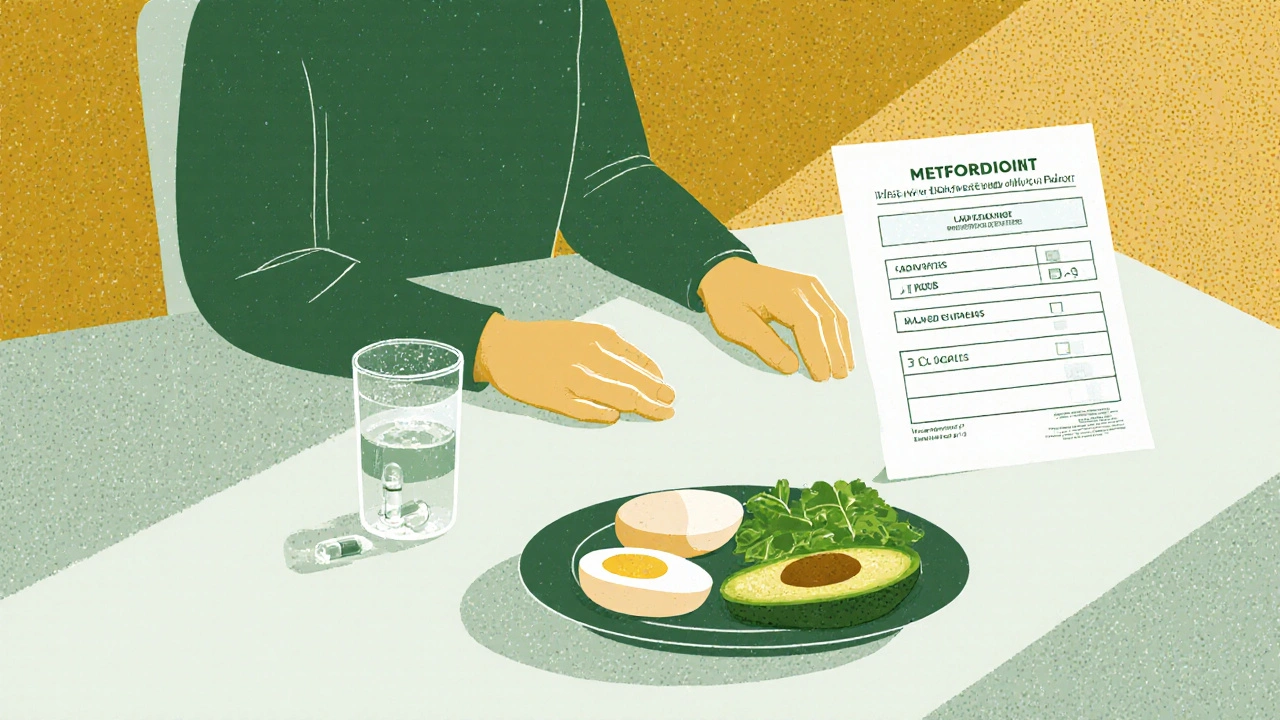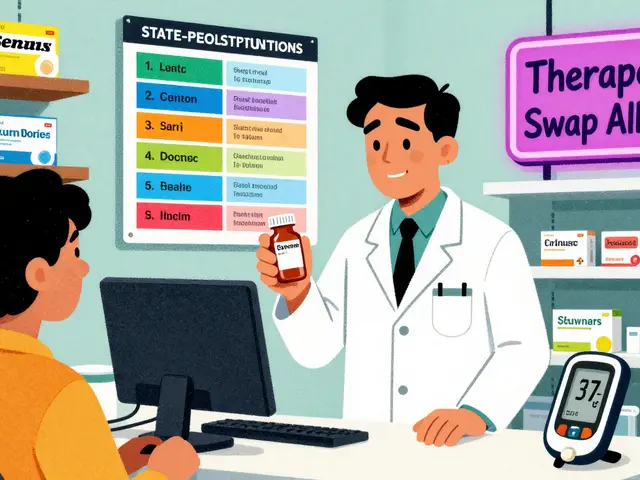Many people start taking metformin for type 2 diabetes or PCOS expecting better blood sugar control-but some end up feeling more tired than ever. If you’ve been on metformin and suddenly can’t get through the afternoon without a nap, you’re not alone. Fatigue is one of the most common complaints among users, but it’s also one of the least understood. The truth? Metformin doesn’t directly cause fatigue, but it can trigger a chain reaction in your body that leaves you drained. And for some, it might even help.
How Metformin Works (And Why It Might Make You Tired)
Metformin is a biguanide, a class of drugs that reduces glucose production in the liver and improves insulin sensitivity. It doesn’t make your body produce more insulin-it helps your cells use what’s already there more efficiently. That’s why it’s so effective for people with insulin resistance.
But here’s the catch: when your body starts using glucose more efficiently, your blood sugar levels drop. For many, that’s a good thing. For others, especially those who were previously running on high blood sugar, it feels like a crash. Low blood sugar-even mild, non-diabetic hypoglycemia-can cause fatigue, brain fog, and dizziness. You might not feel like you’re having a sugar crash, but your brain is telling you otherwise.
Metformin also interferes with vitamin B12 absorption. Studies from the Journal of Clinical Endocrinology & Metabolism show that up to 30% of long-term metformin users develop a B12 deficiency. Vitamin B12 is essential for red blood cell production and nerve function. Without enough of it, you can feel weak, tired, and mentally sluggish. These symptoms mimic fatigue caused by poor sleep or stress, but they’re rooted in a nutrient gap.
Who’s Most Likely to Feel Fatigued on Metformin?
Not everyone gets tired on metformin. But certain factors make it more likely:
- People with existing B12 deficiency-vegetarians, older adults, or those with gut issues like Crohn’s disease-are at higher risk.
- Those who start with high doses-jumping straight to 1000 mg twice daily can cause more side effects than gradually increasing.
- People with poor diet or low calorie intake-if you’re eating too little, metformin’s effect on glucose metabolism can push you into energy deficit.
- Those with undiagnosed thyroid issues-hypothyroidism and insulin resistance often occur together. Metformin won’t fix a slow thyroid, and fatigue may be misattributed to the drug.
A 2023 study tracking 1,200 metformin users over 12 months found that 42% reported increased fatigue in the first three months. But by six months, 68% of those same people said their energy improved. Why? Their bodies adapted. Their B12 levels were corrected. Their diet adjusted. Their blood sugar stabilized.
Can Metformin Actually Help With Energy?
Yes-and this is where things get interesting.
For people with insulin resistance, high blood sugar means energy isn’t getting into cells properly. Your body has fuel, but the doors are locked. Metformin unlocks those doors. Once your cells start using glucose efficiently, you may feel more alert, less sluggish, and more capable of physical activity.
Women with PCOS often report this exact shift. Before metformin, they felt exhausted after minimal effort. After a few months, they started walking more, sleeping better, and feeling less mentally foggy. That’s not placebo-it’s metabolic repair.
Metformin also reduces inflammation. Chronic low-grade inflammation is linked to fatigue, depression, and brain fog. By lowering inflammatory markers like CRP and IL-6, metformin can indirectly improve how you feel day to day.

What to Do If You’re Tired on Metformin
If you’re tired after starting metformin, don’t stop it without talking to your doctor. But do take action.
- Check your B12 levels-ask for a serum B12 test and methylmalonic acid (MMA). MMA is a more accurate marker of functional B12 deficiency.
- Consider a B12 supplement-sublingual methylcobalamin (1000 mcg daily) is often better absorbed than oral cyanocobalamin. Many people feel a difference in 2-4 weeks.
- Don’t skip meals-eat balanced meals with protein, fiber, and healthy fats. Avoid sugary snacks that cause spikes and crashes.
- Try a lower dose-if you started at 1000 mg twice daily, ask if you can drop to 500 mg twice daily and build up slowly.
- Test your thyroid-TSH, free T3, and free T4. If you’re hypothyroid, metformin won’t fix that.
- Track your sleep and stress-poor sleep and high cortisol worsen fatigue. Metformin doesn’t cause insomnia, but stress can amplify side effects.
One patient I worked with in Wellington, a 48-year-old woman with prediabetes, felt so tired she canceled her weekly walks. After checking her B12 (it was 180 pg/mL-low normal), she started taking a daily methylcobalamin tablet. Within three weeks, she was back on her feet. Her energy didn’t skyrocket, but the constant fog lifted. She didn’t need more caffeine-she just needed the right nutrient.
When to Worry About Fatigue
Most fatigue from metformin is mild and temporary. But if you experience any of these, contact your doctor immediately:
- Extreme weakness or muscle pain
- Difficulty breathing or unusual drowsiness
- Stomach pain, nausea, vomiting, or diarrhea that won’t go away
- Feeling cold, dizzy, or lightheaded even when sitting still
These could be signs of lactic acidosis-a rare but serious side effect of metformin, especially in people with kidney problems. It’s extremely uncommon (about 3 cases per 100,000 users per year), but it’s not something to ignore.

Alternatives If Metformin Isn’t Working for You
If fatigue persists despite correcting B12, diet, and dose, other options exist:
- GLP-1 agonists (like semaglutide or liraglutide)-they improve insulin sensitivity and often boost energy by reducing appetite and stabilizing blood sugar.
- SGLT2 inhibitors (like dapagliflozin)-they help kidneys remove excess sugar through urine, which can reduce insulin spikes and improve energy.
- Lifestyle changes-weight loss, strength training, and consistent sleep can improve insulin sensitivity as effectively as metformin for many people.
But here’s the thing: metformin is still the first-line treatment for a reason. It’s cheap, safe, and backed by decades of data. Fatigue is usually a temporary hurdle, not a dealbreaker.
Final Takeaway: It’s Not the Drug, It’s the Context
Metformin doesn’t cause fatigue the way a cold medicine makes you sleepy. It changes how your body uses energy-and sometimes, that change feels like exhaustion. But with the right support-proper nutrition, B12, gradual dosing, and monitoring-it often becomes the very thing that restores your energy.
If you’re tired on metformin, don’t assume it’s the drug’s fault. Look deeper. Test your B12. Check your thyroid. Eat real food. Move your body. Give your metabolism time to adapt. For most, the fatigue fades. And what’s left isn’t just better blood sugar-it’s better energy, clearer thinking, and more life.
Can metformin cause chronic fatigue?
Metformin doesn’t cause chronic fatigue on its own, but it can lead to fatigue through secondary effects like vitamin B12 deficiency or low blood sugar. Most people find their energy improves after adjusting their diet, taking a B12 supplement, or lowering their dose. If fatigue lasts longer than 3-6 months despite these changes, other underlying causes like thyroid issues or sleep apnea should be investigated.
Does metformin make you sleepy?
Metformin isn’t a sedative, so it doesn’t directly make you sleepy. But if it lowers your blood sugar too much or causes a B12 deficiency, you may feel mentally foggy or physically drained-symptoms that feel like sleepiness. This usually happens in the first few weeks and improves with time and proper nutrition.
How long does fatigue last after starting metformin?
For most people, fatigue lasts 2-6 weeks as the body adjusts. If it persists beyond 3 months, it’s likely due to an underlying issue like B12 deficiency, poor diet, or another medical condition-not the metformin itself. Testing B12 and adjusting your diet often resolves it.
Can you take B12 with metformin?
Yes, you can and should. Metformin reduces B12 absorption, so supplementing is recommended, especially for long-term users. Sublingual methylcobalamin (1000 mcg daily) is the most effective form. Many doctors now check B12 levels every year for patients on metformin and prescribe supplements as needed.
Does metformin help with energy in people without diabetes?
Yes, in some cases. People with insulin resistance-such as those with PCOS, prediabetes, or obesity-often report improved energy on metformin even without diabetes. That’s because their cells weren’t using glucose properly before. Metformin helps unlock that energy. It’s not a stimulant, but it removes a metabolic bottleneck.








11 comments
Kevin Stone
Metformin doesn't cause fatigue, it just exposes how broken your metabolism is. If you're tired after starting it, maybe your body was running on sugar spikes and junk food for years. Time to grow up and eat real food.
Natalie Eippert
My uncle took metformin and started feeling like a zombie. He didn't check his B12. He just blamed the drug. Then he got his levels tested and started supplements. Within weeks he was hiking again. People need to stop being lazy and get labs done.
kendall miles
They don't tell you this but metformin is part of a big pharma plan to make you dependent on B12 shots. The real cause of fatigue is glyphosate in your food. The drug just makes it obvious. I've been off all meds since 2020 and I'm fine. They don't want you to know this.
Bob Martin
So let me get this straight. You're tired because your body finally stopped pretending it's okay to eat donuts for breakfast. Congrats. Your metabolism just gave you a 2-week timeout. Take the B12. Eat protein. Stop whining.
Sage Druce
I was skeptical at first but this is so true. I started metformin for PCOS and felt like I was dragging through concrete. I got my B12 checked and it was borderline. Started methylcobalamin and within a month I had energy to go for walks again. It's not magic, it's just your body finally getting what it needs. You got this.
Tyler Mofield
It is imperative to underscore that the pharmacokinetic modulation of hepatic gluconeogenesis via biguanide intervention does not inherently induce fatigue. The observed somnolence is a secondary consequence of micronutrient dysregulation and metabolic recalibration. One must therefore conduct comprehensive hematologic and endocrine profiling prior to attributing symptoms to the agent itself.
Stuart Palley
I've been on metformin for 7 years. I felt like a ghost for the first six months. Then I started taking B12. Now I feel better than I did at 25. This isn't about the drug. It's about your body finally telling you you've been screwing yourself over for years.
Glenda Walsh
Did you know that metformin can also cause hair loss? And it can make your breath smell like metal? I read this one time on a forum. And I think it's related to the B12 thing. But also maybe the GMOs? I'm not sure. But I think you should get tested for everything. Like, everything.
Tanuja Santhanakrishnan
As someone from India with PCOS, I can say this: metformin changed my life. I used to nap after lunch every day. Now I run 5Ks. I took B12, ate more lentils, stopped sugar. It wasn't the drug alone. It was the combo. You're not broken. You just needed a nudge. And you're not alone.
STEVEN SHELLEY
Metformin is a poison designed by the FDA to make you dependent on supplements. They know it drains your B12 on purpose so you'll buy more pills. I stopped it cold turkey and my energy shot up. I'm 54 and I don't need their drugs. The real cure is fasting and sunlight. They don't want you to know this.
Emil Tompkins
Okay but what if the fatigue is actually the drug working? Like what if your body is detoxing from decades of sugar addiction? What if the fog lifting isn't because of B12 but because your soul is finally waking up? I mean... think about it.